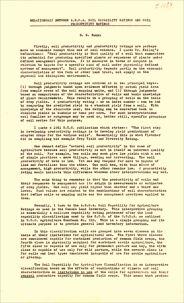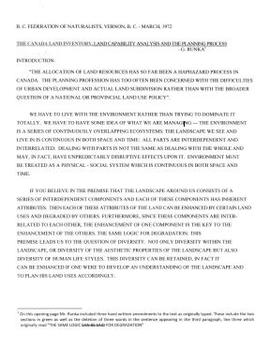File consists of a speech given by Gary Runka entitled "Planning for the Future Agricultural Land Base of Alberta" for Alberta Agriculture Land Use Activities, Edmonton, June 2,1981.
Commentary on this speech by Barry Smith of the Ministry of Agriculture and Lands:
"This appears to be a set of preliminary speaking notes - much of it is point form with considerable hand written notes in the margins. It is not known if these notes were ever finalized into the speech given on June 2,1981 or if the speech was simply given using these notes as its basis.
Many of the references are somewhat oblique relating to topical matters in Alberta. While agriculture is the central theme, this speech is focused on Alberta with little or no reference to the BC farmland preservation program.
Several broader themes are considered which are dealt with in other speeches but GGR speaks to the longer term importance of farmland preservation legislation when stating (p. 3):
"b) from my experience, time is demonstrating ever more clearly to me that, for a variety of reasons, legislating land preservation alone can only hold the land resource for so long if the other aspects affecting the food producing industry are not also given attention e.g.:
- review of regional planning by the ARB
- costs of production and marketing opportunities
- gov't priority for ag. related to other prov. resources
- urban planning - where are the cites going?
- rural planning - how secure are the rural communities of which agriculture is a part?"

